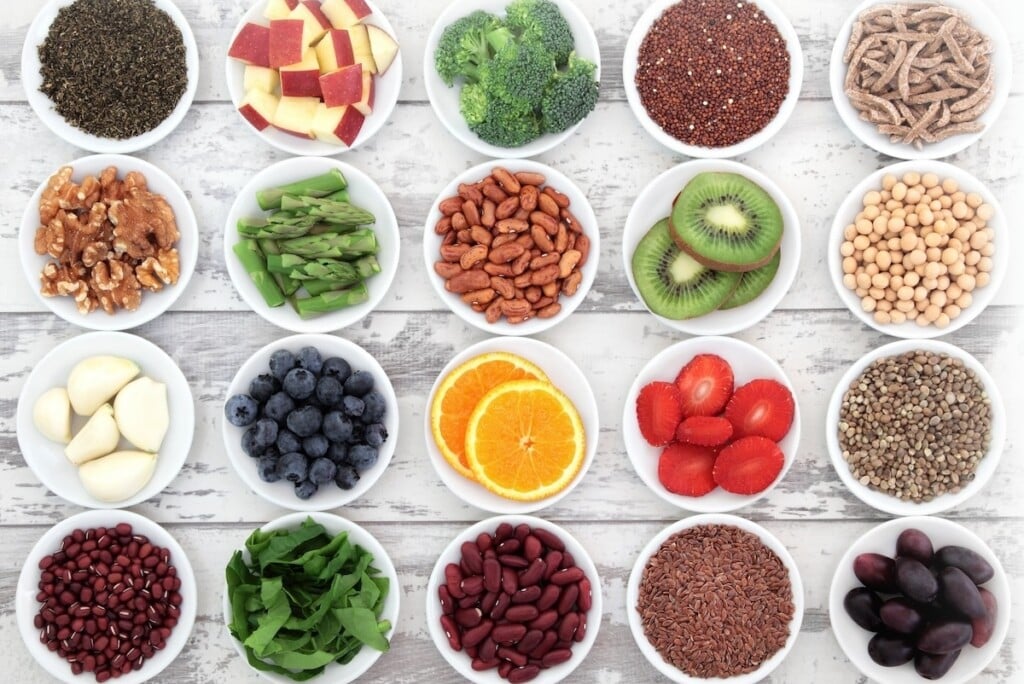15 ‘Super’ Things to Eat
No one “superfood” guarantees good health, but this honor roll of nutritious edibles can help put you on the path.

These days, trendy “superfoods” are said to do everything from decreasing inflammation to improving digestion. “A superfood,” says Julianna Szatmari, a registered dietitian/nutritionist and owner of Intuitively Nourished in Eatontown, “is a nutrient-dense food thought to offer considerable health benefits. For instance, it may be rich in essential vitamins that support bodily functions, minerals that are vital for metabolism and overall health, antioxidants that safeguard cells from damage, fiber that promotes digestive health or healthy fats crucial to heart health and optimal brain function.”
But she adds a caution: “Manufacturers sometimes leverage this term to market products—such as costly powders, snacks and supplements—by associating a ‘superfood’ with extraordinary health benefits, even when such claims lack scientific backing,” she says. Indeed, the Food and Drug Administration (FDA) has no official guidelines for what is and isn’t a superfood. And it’s wise to remember that no one food can by itself redeem an otherwise poor diet.
None of the 15 foods below is a panacea you can simply gobble to ward off all ills. But each has earned a place in your grocery basket with qualities that, yes, you could call “super”:
- AVOCADOS. As our expert pithily puts it, “Hello, healthy fats! Avocados are also high in fiber, which promotes satiety. And they contain monounsaturated fatty acids, which can lower ‘bad’ LDL [low-density lipoprotein] cholesterol levels and reduce the risk of heart disease.”
- BERRIES. The world of berries varies, from the sweet and subtle blueberry to the tart raspberry, but one thing’s consistent: “Berries are packed with antioxidants, including flavonoids, anthocyanins and vitamin C,” says Szatmari. “All of these help protect cells from oxidative damage, reducing the risk of chronic diseases such as cancer and heart disease.” Oxidative damage occurs when your body lacks antioxidants and cannot deal with “rogue radicals”— extra electrons left over from your body’s breaking down food and oxygen.
- CHOCOLATE, DARK. Here’s an indulgence you can feel good about. “Dark chocolate contains essential minerals like magnesium, iron and zinc, which support overall health,” she says. It, too, has antioxidants—specifically flavanols. “Choose dark chocolate with at least 70 percent cocoa content for the most health benefits,” she adds.
- EGGS. “The whole egg is truly a powerhouse of nutrition,” says our expert. “It’s an excellent source of protein; vitamins—including A, B and D; minerals, such as selenium and iron; and healthy fats. Those healthy fats in addition to protein help you feel full for longer, reducing hunger and aiding in weight management.” Though in the past we’ve been warned away from heavy consumption of this breakfast favorite because of its high cholesterol content, recent research indicates that eating one egg a day does not increase the risk of heart attacks, strokes or other cardiovascular diseases.
- FISH. Besides being a great source of protein and a staple in the famous Mediterranean diet, proven to lower heart-disease risk, “fish is rich in omega-3 fatty acids, which reduce inflammation and lower the risk of heart disease, stroke and high blood pressure— along with improving cognitive function, memory and brain development,” she says. “It is recommended that you consume two to three servings of fish per week, preferably oily fish such as salmon, tuna or sardines.”
- GRAINS, WHOLE. Replacing refined grains, such as white bread, pasta and white rice, with whole grains is an easy health swap with big benefits. As the name suggests, refined grains have been processed to remove most parts of the kernel, including the bran, germ and endosperm—which contain the nutrients you don’t want to skip out on. Says Szatmari: “Whole grains are rich in fiber, which aids in preventing constipation and potentially lowering the risk of colorectal cancer. And the increased fiber content contributes to a prolonged feeling of fullness, thereby reducing overall calorie intake.”
- GREENS, DARK AND LEAFY. Greens such as spinach, kale and Swiss chard are packed with beneficial fiber, folate and antioxidants. “These foods are a versatile and nutritious addition to any diet,” she says. “Their wealth of vitamins, minerals and antioxidants supports overall health and well-being, including regulating cholesterol and blood pressure.”
- LEGUMES. There are lots of familiar foods in this category, including peas, chickpeas and all kinds of beans. Szatmari sings their praises as “an exceptional source of plant-based protein that’s also rich in dietary fiber—both of these are essential for digestive health. Legumes can also aid in appetite control, assisting in effective weight management.” They’re also a great protein source for vegetarians and vegans.
- MUSHROOMS. Lauded for the deep umami flavor they can add to dishes, mushrooms can also lend an extra nutritional punch. “Looking to improve your gut health?” she says. “Mushrooms contain prebiotics, which feed beneficial gut bacteria, improve digestion and reduce the risk of gastrointestinal issues. They also contain beta-glucans, which may help lower cholesterol levels, and are an excellent source of vitamin B and vitamin D.” Vitamin D is essential for bone health, and together with calcium can help protect older adults against osteoporosis, according to the National Institutes of Health.
- NUTS. Snack time is saved with these quick, healthy bites. Our dietitian explains: “Nuts are rich in monounsaturated and polyunsaturated fats, which lower ‘bad’ LDL cholesterol and increase ‘good’ HDL [high-density lipoprotein] cholesterol. Nuts also contain fiber, which helps regulate both blood sugar and appetite levels, reducing the risk of type 2 diabetes.” Almonds, walnuts and pistachios all great choices. Avoid sugary trail mixes and “honey roasted” options, which often have a lot of calories added in, and opt for something only lightly salted.
- POMEGRANATES. Besides the bright, acidic and sweet flavor they offer, she says, “pomegranates contain specific antioxidants [called punicalagins] that may improve heart health by reducing inflammation, lowering blood pressure and preventing the buildup of plaque in the arteries.” And that’s not all. “Other benefits of this superfruit include improved skin health, a reduced the risk of urinary tract infections and a boost to exercise performance,” she says.
- SWEET POTATOES. “They’re a nutritious root vegetable that’s an excellent source of vitamins C and B6, as well as minerals like potassium, magnesium and fiber,” she explains. “These delicious starches are also high in vitamin A, which helps protect eyesight and prevent age-related macular degeneration.” The orange color of sweet potatoes comes from beta carotene, which your body processes into vitamin A.
- TOMATOES. Also front and center in the Mediterranean diet—and a staple in backyard vegetable gardens—tomatoes are “high in lycopene, an antioxidant that may reduce the risk of certain cancers,” she said. (These potentially include prostate, lung and stomach cancers, though research is ongoing.) “Tomatoes are also high in lutein and zeaxanthin, which are also antioxidants. They protect the eyes from damage caused by blue light.”
- VEGETABLES, CRUCIFEROUS. Perhaps you dismissed these foods as a child, but you’re grown now. “Common examples are broccoli, Brussels sprouts, cabbage and cauliflower,” says Szatmari. “They contain antioxidants, such as vitamin C, E and beta-carotene, which protect cells from damage. They also have anti-inflammatory compounds such as glucosinolates, which can reduce inflammation throughout the body.”
- YOGURT. Says our expert: “Yogurt is an exceptional source of probiotics, which are beneficial bacteria that support a healthy gut microbiome. These probiotics can enhance digestion, alleviate bloating and prevent constipation. Yogurt is also rich in calcium and vitamin D, both vital for maintaining strong bones and teeth, thereby helping to prevent osteoporosis and fractures.” Greek yogurt in particular is also high in protein. (Pro tip: Use Greek yogurt instead of sour cream when topping baked potatoes or chili for the creaminess without the calories.)

